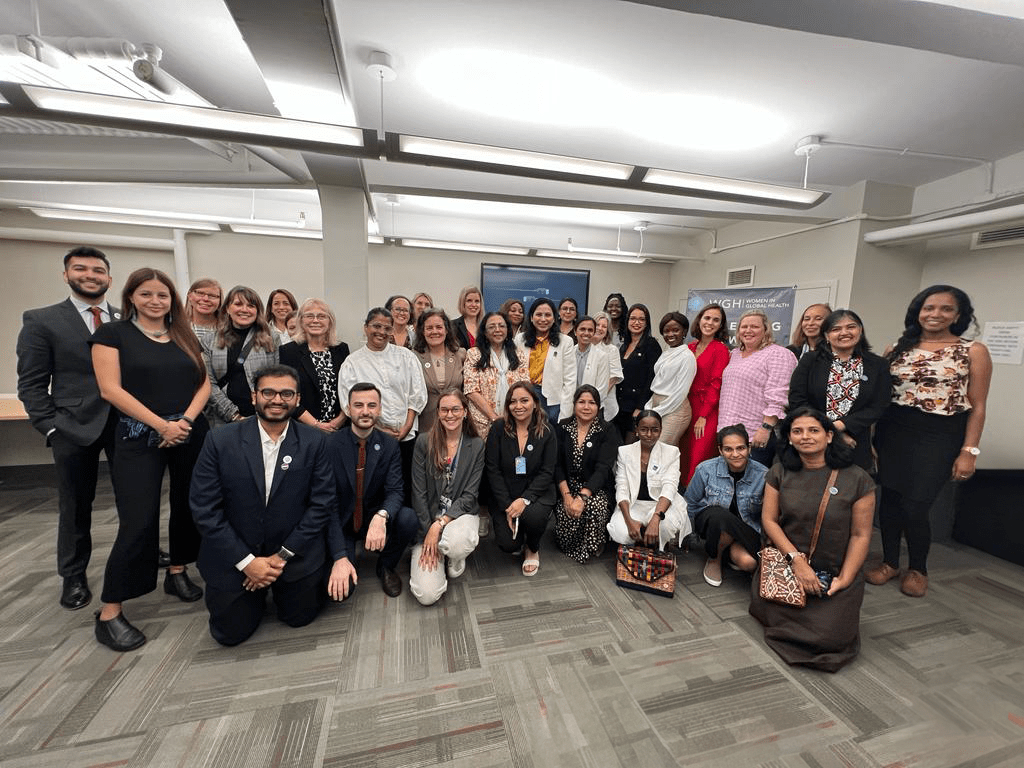
Closing the gap between words in declarations and national action for gender equity in global health
When we were offered the opportunity, as national chapter members of Women in Global Health, to represent our movement at the UN General Assembly, we accepted without hesitation. It’s both humbling and inspiring to stand before global leaders and stakeholders and clearly state, for example, that without addressing gender disparities, we cannot achieve true Universal Health Coverage.
As we sat in UNGA78 events and took in the global community’s dedication to guaranteeing essential health services are accessible to all, regardless of financial constraints, and to the achievement of SDGs by 2030, we wished our national decision-makers could be there to hear it – and that those that were present would take the necessary actions. It was quite clear to us that we would need to go back and be spokespeople for progress, for everything from gender equity to health financing, creating opportunities for stakeholders in our countries to make the right decisions for implementation that moves things forward. As members of a global movement that challenges power and privilege for gender equity, that’s a role we are happy to embrace.
Closing the gap between declarations and implementation
More than a month on from UNGA, it seems even more obvious that we need genuine political commitment and action to follow up on inspiring declarations. Gender transformative approaches are crucial for meeting the SDGs. With only seven years remaining to our 2030 SDG deadline, a mere 15.4 % of Goal 5 (gender equality and women’s empowerment) indicators with data are “on track”, 61.5 % are at a moderate distance and 23.1 % are far or very far off track from 2030 targets. The pandemic only worsened this, multiplying women’s burdens and in some key sectors like health, demanding that we shore up emergency responses with our often poorly paid or unremunerated work, while leadership decisions were made largely by men. Women health workers are fed up with being called upon to prop up systems in times of crisis and to shoulder the burden of frontline crisis response, without adequate protection, recognition or reward. This is having disastrous effects on health systems everywhere, in high-income countries as much as in LMICs, as women leave the sector as part of the Great Resignation and Great Migration.
National accountability
We will only advance towards more equitable health systems as part of business-as–unusual steps to address inequalities that weigh hugely on already fragile systems, especially in low- and middle-income countries. But whose role is it to ensure national governments are held accountable for the commitments they make in global fora? Who can pull us up on the gap between our declarations and our actions? When it comes to health, we know that national-level action on gender equity is essential for meeting SDG commitments, from paying female community health workers delivering critical services in rural areas, to ensuring effective and equitable leadership by appointing women in decision-making positions at all levels, across health system hierarchies where they are currently grossly under-represented. These are tangible areas in which national government action and accountability cannot be avoided.
Giving women their share of leadership
It can be easy to lose heart when we see so much potential for positive change, and yet so little progress on key issues – or worse, regression. On gender-based violence, we are all talking the talk while the problem worsens, aggravated in times of crisis such as the COVID-19 pandemic and stoked by misogyny and the global pushback against women’s sexual and reproductive health and rights. While supportive declarations in fora like UNGA feel uplifting, we still have some way to go when it comes to seeing improvements on the ground.
So what does business-as-unusual mean when it comes to gender equity in global health? One clear step forward is recognising women’s scandalous exclusion from leadership in health. Currently women make up 70% of the health workforce globally and represent about 90% of frontline health workers, but hold just 25% of leadership positions. This gap beggars belief, and it must be bridged without delay, at every available opportunity. While developments such as the nomination of Dr Hanan Balkhy as the next WHO Regional Director for the Eastern Mediterranean and of Saima Wazed as the next WHO Regional Director for South East Asia are positive, we need to see progress across all regions, at all levels.
“Love is shown in the budget”
Lastly but crucially, as one fellow participant shared with us during one session, “love is shown in the budget”. We, as advocates, can only do our best to understand the global financing infrastructure and help change-makers in our national contexts access opportunities for support in health, gender equality and climate financing. This cannot be the end of it though. Much more concerted action is needed. In this hour of crisis for humanity, our governments and our multilateral architecture must act like we mean business, and make that business-as-unusual. If we mean what we say when it comes to gender equity, we must start investing in women’s movements and organizations, who currently receive only a minute proportion of gender equity investment according to OECD DAC data. If we’re serious about UHC, we must start looking after women, who make up 70% of the health workforce. Women have put their lives on the line to save us during the pandemic. We will not ask them now to return to gender inequality and business as usual.
Time is not on our side. When we return to UNGA next year, we hope to see a substantially narrower gap between declarations and implementation.

About Women in Global Health: Women in Global Health (WGH) is the fast-growing women-led movement demanding gender equity in global health. While women represent 70% of the workforce and about 90 %of front-line health workers, they hold just a quarter of leadership positions. WGH has supporters in more than 90 countries and 51 official chapters predominantly in low-income countries.